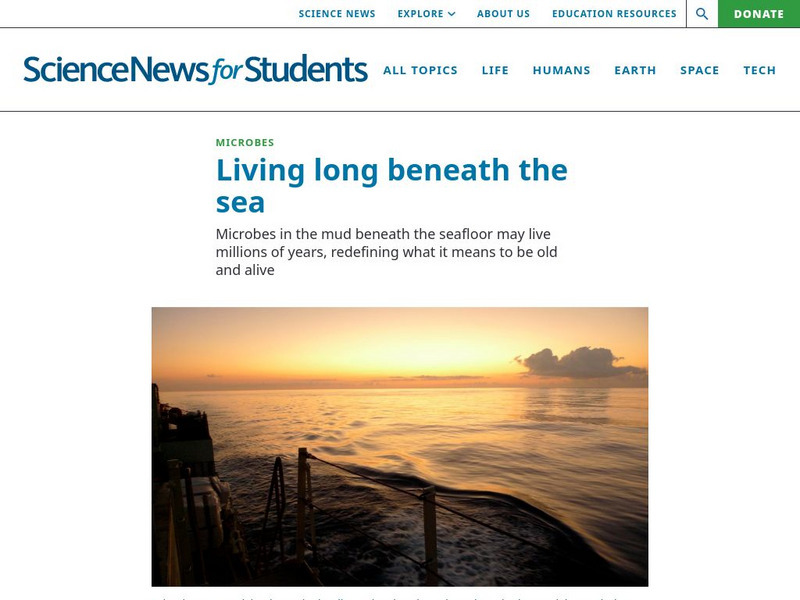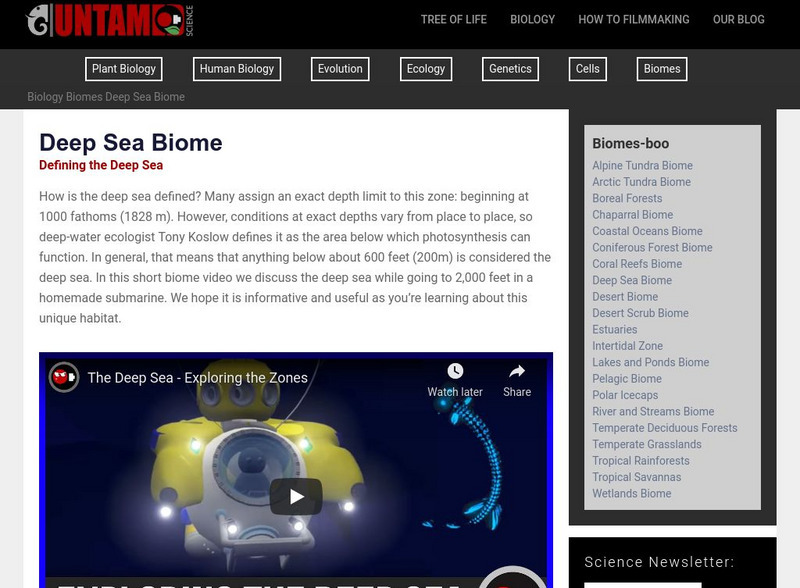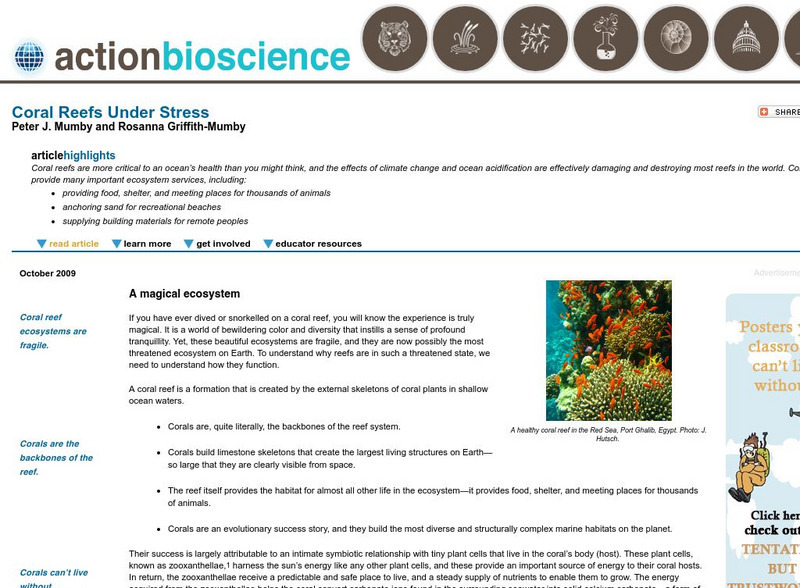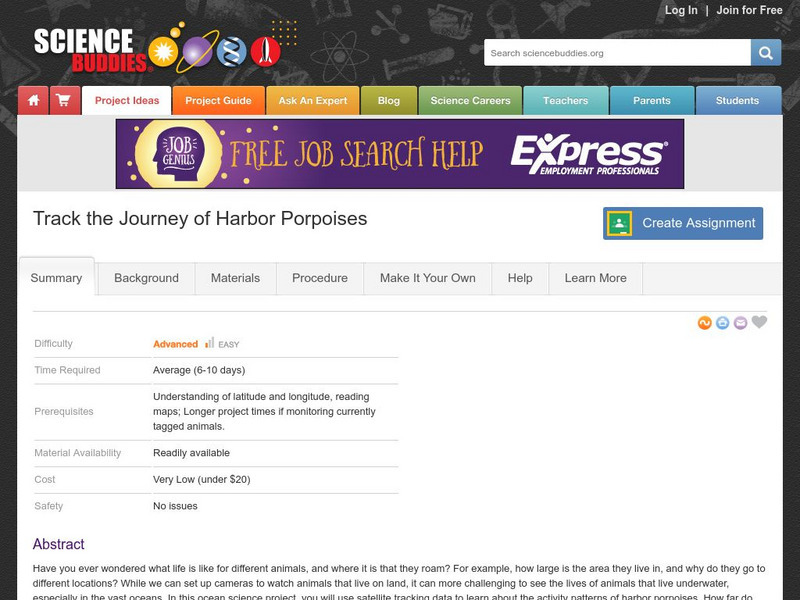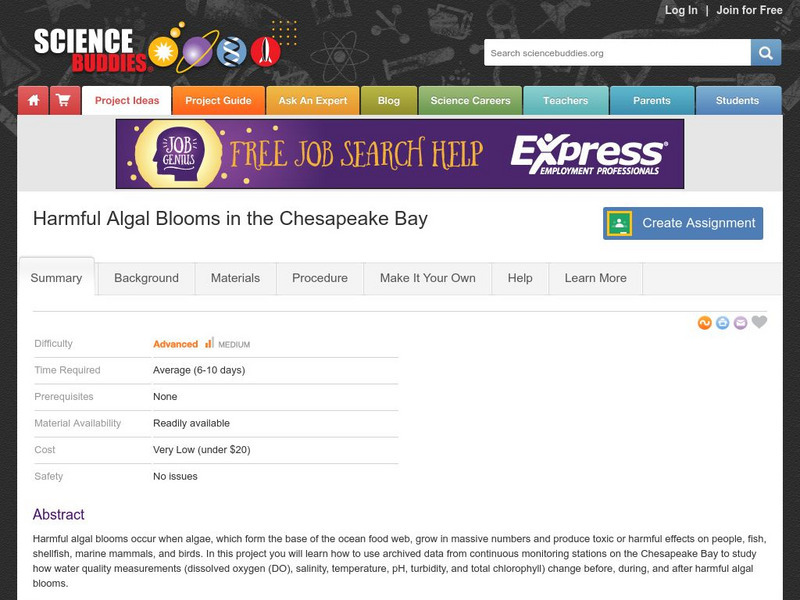Society for Science and the Public
Science News for Students: Beneath the Sea
What does it mean to be alive? Scientists are now revisiting this question as they discover previously unknown microorganisms at the bottom of the ocean.
American Museum of Natural History
American Museum of Natural History: O Logy: Journey to Deep Sea Vents
Take a submersible down to the seafloor. As you descend, passing through the ocean's sunlight, twilight, and midnight zones, you can observe how temperature, pressure, and light levels change. When your submersible reaches the seafloor,...
Other
Florida International University: Medina Aquarius Program
The official site for an underwater ocean laboratory located near the Florida Keys. Information about the lab and its work, as well as ocean and coral reef info for teachers and students. Includes photos, lesson plans, and links to other...
NOAA
Noaa: Ocean Science Careers
Study the different types of ocean related careers that are available and how you can make a difference without having to be a professional.
NOAA
Noaa: Year of the Ocean, Kids and Teachers Corner
Great resources on a variety of ocean and environmental concerns, endangered plants and animals, climate and habitats, frequently asked questions and fact sheets.
TED Talks
Ted: Ted Ed: 7 Things We Don't Know About the Ocean
The ocean covers 70% of the planet, but humans still don't know very much about it. In this video, Hank Green from SciShow discusses seven mysterious ocean topics. [10:31]
Untamed Science
Untamed Science: Biology: World Biomes: Deep Sea Biome
Read about the different zones and life in the deep sea as well as watch videos and examine photos of this aquatic biome. [5:54]
Other
Young Ocean Explorers
This amazing website brings the ocean direct to your computer with high-quality, fact-filled videos. Articles answer everything you ever wanted to know about the ocean.
Scholastic
Scholastic Explorers: Ocean Life
This lesson plan explores how human activity has an impact on turtles, sea otters, and dolphins in different parts of the world. Your students will read field reports from the sites and evaluate data that is offered.
National Geographic
National Geographic: Geostories: Ocean Exploration
This Geostory illustrates pivotal events in undersea understanding.
Other
Ocean Real Images: Pygmy Seahorse: Facts and Images
View a large image gallery of these unusual ocean creatures while also learning scientific facts about this unique type of seahorse.
National Geographic
National Geographic: Ecosystem Imbalance in the World
In this lesson, students build on their knowledge of individual impacts on the ocean to see how the whole system can react to threats and changes. They examine ways in which human actions throw marine ecosystems out of balance, explore...
American Museum of Natural History
American Museum of Natural History: Oology: Expeditions
This student module includes short, informational text, images, interactive games, and quizzes about ocean exploration.
American Institute of Biological Sciences
Action Bioscience: Coral Reefs Under Stress
Coral reefs, home to many vibrant plants and animals, are suffering from the affects of climate change and the increase of acid in ocean waters. Delve into the benefits and concerns of these beautiful ecosystems.
Boise State University
Boise State University: Hadalpelagic Zone
View images and learn facts about this zone found deep in the ocean.
PBS
Pbs Teachers: Ocean Careers Exploration
Investigate careers in oceanography and marine exploration. Create a report on the life, education and career of a member of the Ocean Adventures Expedition team and present it in a creative way.
PBS
Secretes of the Ocean Realm: Creatures of Darkness
A PBS series site designed for educators to teach students the concempt of bioluminescence in marine life.
The Franklin Institute
Marshall Elementary School: Ocean Games & Puzzles
Complete interactive word searches to find animals of the intertidal zone. Learn ocean facts by completing a crossword puzzle. Match up pieces of a puzzle to display the water cycle. And after learning all that information, test yourself...
TED Talks
Ted: Ted Ed: Sylvia Earle's Ted Prize Wish to Protect Our Oceans
What's been happening to the world's oceans over the past 50 years? Ocean researcher, Sylvia Earle, shares breathtaking images of the ocean and surprising details about the many problems plaguing its health. [18:12]
Other
Voyage to the Deep: Tubeworm
This is a very brief overview of tubeworms, a hydrothermal vent marine animal.
The Wild Classroom
The Wild Classroom: Biomes of the World: Coastal Ocean Biome
Learn about the coastal ecosystem. Find out about plants, animals, adaptations, and conservation efforts.
Science Buddies
Science Buddies: Harbor Porpoise Movement
In this project you can use archived satellite tracking data to learn about activity patterns of harbor porpoises. How far do they travel? Can you find patterns in the routes individual animals take? Can you correlate their route with...
Mariners' Museum and Park
Mariner's Museum: Women and the Sea
Enter the world of the sea and find out how women have played an active role in maritime affairs throughout history. Read about everything from mythical mermaids to real women in the navy.
Science Buddies
Science Buddies: Harmful Algal Blooms in the Chesapeake Bay
Harmful algal blooms occur when algae, which form the base of the ocean food web, grow in massive numbers and produce toxic or harmful effects on people, fish, shellfish, marine mammals, and birds. In this project you will learn how to...


